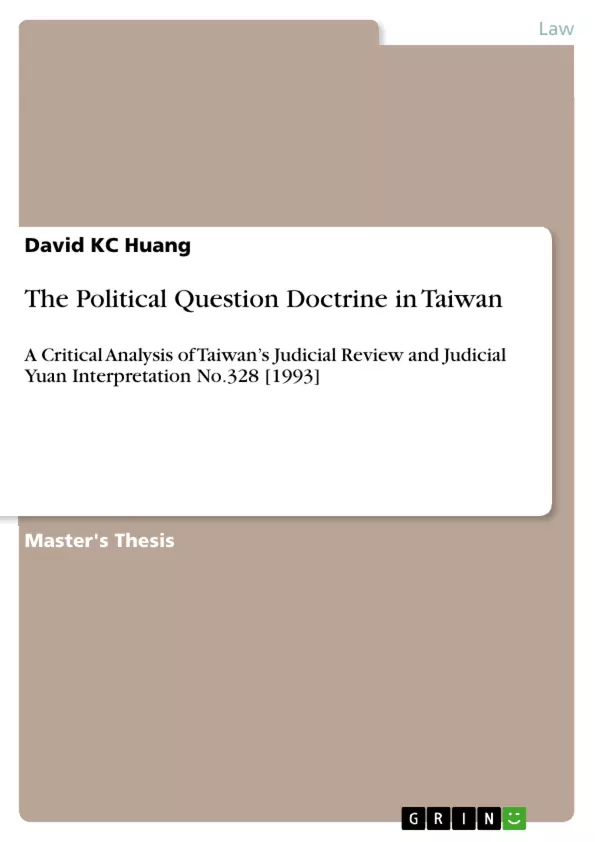This thesis studies Judicial Yuan Interpretation No.328 [1993] – the first constitutional court decision specifically relating to the use of the political question doctrine in Taiwan. Taiwan’s constitutional court, on the whole, does not refuse to involve itself in political questions, but this case represented an opportunity for the Justices of the Republic of China (Taiwan) to introduce the political question doctrine into Taiwan’s legal system. The Judicial Yuan’s previous and subsequent judicial reviews included cases in which the constitutional court dismissed the authoritarian congress for democratisation or struck down an unconstitutional constitutional amendment.
It is therefore doubtful that the Justices would claim to be unable to determine the political question in Judicial Yuan Interpretation No.328 [1993]. The court had by then become too powerful to persuade people that it should address the political question doctrine. The Justices applied the political question doctrine in this case only because they wished to avoid becoming mired in political controversy.
Inhaltsverzeichnis (Table of Contents)
- ABSTRACT
- 1. INTRODUCTION
- 2. LITERATURE REVIEW: POLITICAL QUESTION DOCTRINE
- 3. METHODOLOGY
- 4. POLITICAL QUESTION REVIEW ONE: TERRITORIAL CONTROVERSIES
- Formosa and the Pescadores
- Mainland China
- Outer Mongolia
- 5. POLITICAL QUESTION REVIEW TWO: CONSTITUTIONAL ANALYSIS
- 6. POLITICAL QUESTION REVIEW THREE: JUDICIAL BEHAVIOUR
- 7. CONCLUSION
Zielsetzung und Themenschwerpunkte (Objectives and Key Themes)
This thesis examines Judicial Yuan Interpretation No. 328 [1993], the first constitutional court decision in Taiwan specifically addressing the application of the political question doctrine. The thesis explores the circumstances surrounding the decision and analyzes the factors that influenced the court's decision to apply the doctrine. It aims to provide a critical analysis of Taiwan's judicial review system and the role of the Judicial Yuan in interpreting the constitution.
- The Political Question Doctrine in Taiwan
- Judicial Review and the Judicial Yuan
- Constitutional Interpretation and Territorial Disputes
- Judicial Behaviour and Strategic Decision-Making
- Taiwan's Constitutional Law and Political System
Zusammenfassung der Kapitel (Chapter Summaries)
- Chapter 1: Introduction: This chapter introduces the political question doctrine and its relevance to Taiwan's constitutional law. It highlights the Judicial Yuan's limited use of the doctrine and the significance of Judicial Yuan Interpretation No. 328 [1993] as the first instance of its application in constitutional litigation.
- Chapter 2: Literature Review: Political Question Doctrine: This chapter examines the existing scholarship on the political question doctrine, focusing on its historical development, theoretical foundations, and application in different jurisdictions. It discusses the criteria used for invoking the doctrine and the challenges involved in defining its scope.
- Chapter 3: Methodology: This chapter outlines the research methodology employed in the thesis, including the sources of data, methods of analysis, and theoretical framework. It discusses the approach taken in examining Judicial Yuan Interpretation No. 328 [1993] and its implications for understanding Taiwan's constitutional jurisprudence.
- Chapter 4: Political Question Review One: Territorial Controversies: This chapter examines the specific territorial disputes involved in Judicial Yuan Interpretation No. 328 [1993], including the status of Formosa, the Pescadores, Mainland China, and Outer Mongolia. It analyzes the constitutional and historical context of these disputes and explores the political and legal ramifications of their resolution.
- Chapter 5: Political Question Review Two: Constitutional Analysis: This chapter delves into the constitutional analysis underpinning Judicial Yuan Interpretation No. 328 [1993]. It examines the relevant provisions of the ROC Constitution, including the constitutional status of the disputed territories and the role of the Judicial Yuan in interpreting constitutional provisions. It also explores the interplay between constitutional law and political realities in the context of Taiwan's unique historical and geopolitical circumstances.
- Chapter 6: Political Question Review Three: Judicial Behaviour: This chapter examines the judicial behavior of the Justices of the Judicial Yuan in deciding Judicial Yuan Interpretation No. 328 [1993]. It analyzes the factors that influenced their decision to invoke the political question doctrine, considering their legal reasoning, political considerations, and strategic motivations. It explores the impact of this decision on the relationship between the Judicial Yuan and the government, and on the development of constitutional law in Taiwan.
Schlüsselwörter (Keywords)
The main keywords and focus topics of this thesis include the political question doctrine, judicial review, constitutional interpretation, Taiwan's Judicial Yuan, territorial disputes, judicial behavior, and strategic decision-making. It analyzes the role of the Judicial Yuan in interpreting the ROC Constitution, specifically examining the case of Judicial Yuan Interpretation No. 328 [1993], which addressed the territorial disputes and introduced the political question doctrine into Taiwan's legal system.
- Quote paper
- David KC Huang (Author), 2012, The Political Question Doctrine in Taiwan, Munich, GRIN Verlag, https://www.grin.com/document/503643



